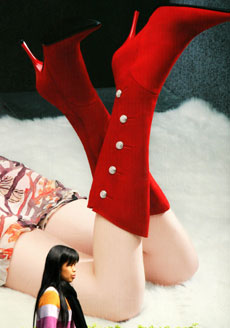Chinese exporters lose out.
European manufacturers in China lose out.
European exporters lose out.
And European consumers lose out.
The provisional tariffs slapped on Chinese leather shoes by the European
Union (EU) is a lose-lose situation which must be turned around, a top
Commerce Ministry official said Thursday.

A woman walks past a
poster advertising shoes in Guangzhou, southern China February 21, 2006.
[Reuters] |
The EU was not justified in imposing
the anti-dumping penalties because there was no credible evidence for denying
market economy status to Chinese shoemakers, Vice-Minister of Commerce Gao
Hucheng told China Daily.
He was referring to the EU decision to levy provisional tariffs on imports of
Chinese leather shoes. The measures come into force today and gradually rise
from 4.8 per cent to 19.4 per cent by October, when a final decision is
expected.
"The EU declined to grant market economy status to 13 firms it investigated
on the spot. But all of them are privately-owned or foreign-invested, and comply
with the criteria for market economy treatment," said Gao, also the ministry's
international trade negotiation representative.
"It also denied market economy treatment to non-sampled companies, about 150
or 90 per cent of the total respondents, without giving any explanation," he
added.
The EU began to give market economy status to some Chinese firms in
anti-dumping cases in 1998. As China has not yet been recognized as a full
market economy by the EU, the status helps individual companies gain access to
the European market.
The EU violated not only World Trade Organization anti-dumping rules but also
its own laws and anti-dumping procedures, Gao said, because none of the 160
respondents had received disclosure from the EU on their claim for individual
treatment.
The EU's determination on dumping and injury in the case lacks enough
evidence, he said.
Shoemaking is a labour-intensive industry in which China enjoys comparative
advantages in terms of labour and resources; and the EU should not arbitrarily
regard the price advantage of Chinese leather shoes as amounting to dumping, he
said.
"Most Chinese shoemakers are small- and medium-sized companies that are not
able to dump goods in the EU market," he added.
He noted that the European petitioner listed only 6 of 15 injury evaluation
indicators required by the WTO Anti-dumping Agreement.
"So the EU lacks adequate evidence to file the case," Gao said. Since no harm
has been done to the EU industry, there is no reason for the case, he said.
The penalties were also against EU companies' interests, Gao pointed out.
According to Chinese statistics, footwear producers from the original 15 EU
member states have set up 478 plants in China with an actual direct investment
of US$737 million; and they also export to the European market.
"Anti-dumping measures against Chinese footwear exporters will surely impair
the profits of EU footwear producers and investors in China," Gao said.
Chinese footwear exports are basically low- and middle-end products, while
the EU produces mostly high-end goods, he said.
"Meeting different needs of consumers, the two kinds of products are not in
direct competition; and have obvious differences in sales channels and market
segmentation. The anti-dumping measures are not only unnecessary but also
harmful to the interests of EU middle- and low-end consumers," he explained.
Gao said footwear exports from China generate lucrative returns for EU
importers and retailers and provide a large number of jobs in the economic bloc.
The development of the Chinese footwear industry also ensures EU exports of
shoe-making machinery, leather and other raw materials every year.
According to Chinese customs statistics, in the first 11 months of 2005,
leather imports from the EU reached US$570 million, a year-on-year increase of
27 per cent. China imported US$54.04 million worth of shoe-making machines from
the EU in 2004, up 26 per cent year-on-year.
Gao urged the EU to treat Chinese firms fairly and re-evaluate the whole case
to ensure the development of shoe trade.
Last July, the EU initiated anti-dumping investigations into leather shoes
worth US$730 million from China the largest single anti-dumping case between the
two economies.
According to statistics from the Ministry of Commerce, the EU is not only
China's largest trade partner but also a major source of dumping charges against
China.
(China Daily 04/07/2006 page1)